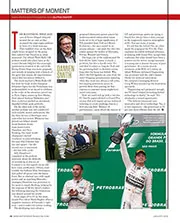
Matters of Moment, January 2016
The blustering wind and rain of Storm Abigail whipped around the six men as they mounted the impromptu podium in front of a bleak seascape. They huddled close on the…
self-changing gear-boxes, there is a slight whine on second and first.
The centrifugal clutch disconnects the gear-box from the engine when the latter is ” ticking-over ” and thus avoids the rumbling sounds almost unavoidable with epicyclic gears still revolving in the free-engine position.
The body is handsome, low-built and follows semi-streamline contours, but yet remains essentially British in outline. The bonnet and large front wings give a sense of solidarity which is not belied by the feel of the car. The nearside mudguard is hidden by the bonnet, but as it does not project far outside this is not so serious. Less pleasant are the windscreen pillars which are thick enough to impede the driver’s vision when turning to the right. The interior of the car is light and cheerful with ample headroom, and the rear light is large enough to make reversing easy without having to lean out of the car. A spacious luggage boot capable of holding half-a-dozen good-sized suitcases blends gracefully with the flowing lines of the body.
The separate front seats and the large rear seat are set at restful angles and the rear passengers have plenty of room to stretch their legs. Leather upholstery is standard. The driving position is excellent, and the hand-brake is convenient for the right hand, but set forward so as to allow easy access through the door on the driver’s side.
The engine is a six-cylinder Coventry Climax unit, with push-rod overhead inlet valves and exhaust valves at the side. This arrangement permits of exceptionally large water passages round parts exposed to extreme heat. The cylinder-block is cast integral with the crank-case, and an interesting point is that renewable hardened liners are fitted from the outset.
The crankshaft runs in four bearings and is dynamically balanced, and the engine may be run up to 6,000 r.p.m. without ill effects. The sump holds over two gallons, and a water pump driven by the main timing chain ensures freedom from trouble even when the car is driven hard in mountainous country. Coil ignition is used, with automatic advance and retard, with an auxiliary lever on the steering column. This is normally set at full advance and brought back about half-way when running in traffic. The down-draught Zenith carburetter is supplidd by an electric petrol Pump on the dash. The rear tank holds eight gallons and the car runs best on ethylised petrol. The petrol gauge did
not seem to be functioning properly, but the consumption as far as we could gather was about 16 m.p.g. The clutch and gear-box have already been described. The transmission follows conventional lines with an peller shaft and a spiral-bevel The chassis is upswept front open proback axle. and rear,